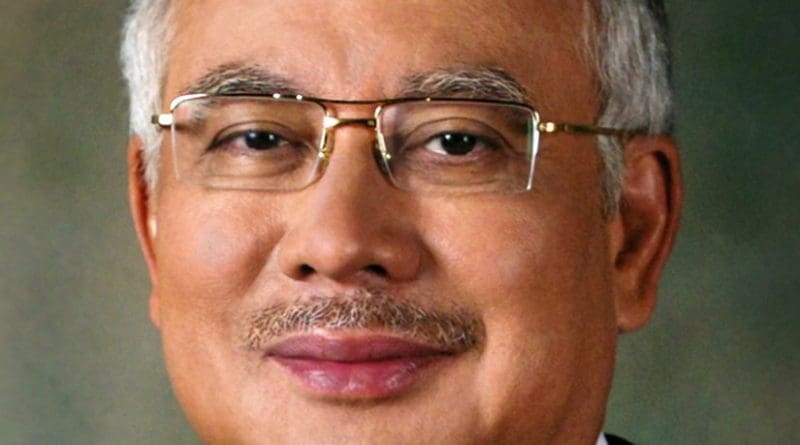Malaysia: Election Race Tightening For PM Najib Razak
By UCA News
Malaysian Prime Minister Najib Razak assures Malaysia’s impending 14th general election will be free and fair but says he needs inspiration on when to dissolve parliament and allow the nation’s citizens to deliver judgment on his spotty leadership.
“As long as we do it within the ambit of the constitution. Let’s see whether we have to wait until June [the automatic dissolution of parliament] or earlier. We will see how things develop,” he was reported him as saying on Jan. 30 after chairing a meeting of his party, the United Malays National Organisation (UMNO), in Kuala Lumpur.
His remarks paint a picture of a worried, even fearful coalition government conceding it is facing one of its most difficult tests since coming to power in 1957.
Najib knows he is being given a run for his money, some of which was allegedly looted from a state wealth fund. He is the subject of a kleptocracy investigation by the U.S. Department of Justice and government investigators in several foreign capitals. He denies any wrongdoing.
But the swell of popular opinion against him and UMNO, the lynchpin of the Barisan Nasional coalition government, has only increased concerns that electoral fraud and dirty politics will be used to carry him and the coalition over the finish line again.
A significant number of voters are frustrated and scared about the direction Malaysia appears headed since he became prime minister in April 2009. Fundamental Islam has gained strength under him, the cost of living has risen and living standards have tumbled, especially among lower-income groups.
Najib claims to be leading the country to a better future. Yet communal and religious discord has grown, the economy is sputtering and new security laws are in place. In the 2013 elections, Barisan Nasional lost its two-thirds majority in parliament and its victory was with only 47 percent of the popular vote.
It showed that the electoral system was tilted in the government’s favor by increasing seats in the rural Malay heartlands despite fewer voters and limiting seats in urban areas with more voters because Najib is popular there.
More rural constituencies are due to be added, improving Barisan Nasional’s chances of hanging on to power. Electoral boundaries have been redrawn and new constituencies demarcated along ethnic lines in the multi-religious and multi-ethnic nation.
Fears of another skewed election are genuine. Complaints about irregularities during the re-delineation process have been ignored. Electoral reform movement Bersih warns that postal voting remains open to abuse as observed in previous elections. Its calls for greater checks and balances have gone unheeded.
Nurul Izzah Anwar, the daughter of charismatic jailed opposition leader Anwar Ibrahim, has predicted that the new electoral boundaries drawn up will be passed by parliament in March.
She believes the ruling coalition will ram through the re-delineation niceties without scrutiny, paving the way for what she calls the “dirtiest elections ever” and further damaging faith in the Malaysian system of government. Some youth have already given up on their leaders and started a campaign to boycott the lot of them.
The opposition alliance, Pakatan Harapan, wants Najib to invite independent election observers to Malaysia for the election to prove his claim that the poll will be free and fair.
The alliance’s deputy president, Muhyiddin Yassin, the former deputy prime minister who was ousted from office by Najib for questioning his role in the 1MDB scandal, said this was the only way to prove the claim that there would be “no room” for cheating.
It wants the government to invite election observers from the Commonwealth Secretariat and the United Nations. Malaysia has never invited established and independent international election observation teams before. In 2013, observers from the Election Commission’s counterparts in the Asean region were invited but disallowed from publicizing their findings.
Muhyiddin said Najib’s claim that there was no room for cheating was meaningless as cheating was already taking place.
“Anyone who studies the electoral maps will know that changes were intentionally made to favor Barisan Nasional. Is this not a form of cheating?” he said in a statement on Feb. 2.
Critics have also noted how there are thousands of dubious entries in the voter list, often without proper addresses.
The government’s decision to establish a special committee to formulate laws to curb “fake news” has also raised concerns about the freedom of the press.
Efforts to curb “fake news” should not come at the expense of freedom of speech, expression, information and the press, said Eric Paulsen, head of the NGO Lawyers for Liberty, in a statement on Feb. 2.
Meanwhile, the vast majority of opposition supporters have placed their faith in former prime minister Mahathir Mohamad, once described as authoritarian and corrupt himself, to lead the charge against Barisan Nasional and Najib.
Ironically, it was Mahathir who paved the way for current abuse of the political system. He will get a dose of his own medicine when elections are called.
The notion that a government can carry on without change after the shellacking it received in 2013 is absurd. Is all that it has done legitimate? Technically, yes. But it is arrogant and stupid to ignore the common sense demands of Malaysian citizens — accountability, fairness and an end to corruption.

